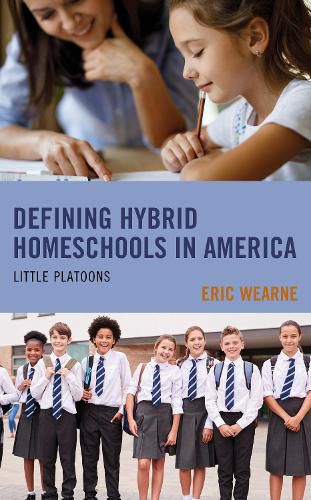Readings Newsletter
Become a Readings Member to make your shopping experience even easier.
Sign in or sign up for free!
You’re not far away from qualifying for FREE standard shipping within Australia
You’ve qualified for FREE standard shipping within Australia
The cart is loading…






Defining Hybrid Homeschools in America: Little Platoons explores the idea of hybrid homeschools, where students attend a formal school setting for part of the week and are homeschooled the rest of the week. Eric Wearne observes that school choice in America typically comes in two forms: programs set up for disadvantaged students, and the more common form of choice that wealthy parents can exercise-paying private tuition or moving to a more desirable school district. While disadvantaged families in many places and wealthy families everywhere can exercise choice when it comes to schooling, a sizeable group typically gets left out of those options-the large number of families who are too wealthy to access state or local programs, but not wealthy enough to pay for private schooling or moving expenses. Wearne argues that this is a long-term weakness for school choice in America; the middle class is generally a well-off demographic, but is almost completely unserved when it comes to this large aspect of their children’s lives. However, one low-cost option has arisen to address this niche: hybrid home schools. Wearne cites existing research to argue for this model’s efficacy for the middle class as a strong example of a healthy civil society and examines how policy definitions are breaking down and evolving in education as we challenge the existing definitions of schooling.
$9.00 standard shipping within Australia
FREE standard shipping within Australia for orders over $100.00
Express & International shipping calculated at checkout
Defining Hybrid Homeschools in America: Little Platoons explores the idea of hybrid homeschools, where students attend a formal school setting for part of the week and are homeschooled the rest of the week. Eric Wearne observes that school choice in America typically comes in two forms: programs set up for disadvantaged students, and the more common form of choice that wealthy parents can exercise-paying private tuition or moving to a more desirable school district. While disadvantaged families in many places and wealthy families everywhere can exercise choice when it comes to schooling, a sizeable group typically gets left out of those options-the large number of families who are too wealthy to access state or local programs, but not wealthy enough to pay for private schooling or moving expenses. Wearne argues that this is a long-term weakness for school choice in America; the middle class is generally a well-off demographic, but is almost completely unserved when it comes to this large aspect of their children’s lives. However, one low-cost option has arisen to address this niche: hybrid home schools. Wearne cites existing research to argue for this model’s efficacy for the middle class as a strong example of a healthy civil society and examines how policy definitions are breaking down and evolving in education as we challenge the existing definitions of schooling.